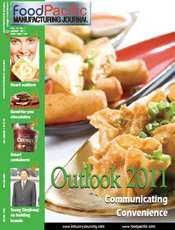Food Pacific Manufacturing Journal
RETAILERS in developed countries are dictating the way many foods and beverages are packaged. In Europe, companies such as Tesco, Carrefour, Ahold and Sainsbury's, for instance, are signatories along with Coca-Cola, Heinz, Nestlé and Procter & Gamble to the ""Courtauld Commitment"" to reduce packaging and the supply chain waste. In 2009, Wal-Mart launched their ""Sustainability Index"", whose end goal is to measure the sustainability of every product it sells and in the process, the giant retailer is using its heft to prod 100,000 suppliers worldwide to measure up. Consumers will eventually be able to see the lifecycle data product labels ""so they can make choices and consume in a more sustainable way,"" Wal-Mart says.
In emerging economies, consumers in urban areas have become very much like other savvy buyers worldwide. Asian retailers and packaged food manufacturers now deal with consumers who are value-for-money conscious but who are also attracted to convenience benefits. In the Philippines, for instance, private labels have become highly acceptable – the country's top retailer now offers staples and basic foods under its house brand. This leaves much more in the budget for indulgences.
Economic recovery means consumers are more confident about spending even as it makes them more discriminate and even demanding. This demand for products with added value is being driven by demographic change, whether they are teens in Viet Nam choosing drinks with more exciting flavours, sophisticated ""Generation Me"" Singaporeans with a preference for sizzle in their snacks or geriatrics in Japan looking for youth in easy-open bottles.
But here's something for baby boomers, thirtysomethings and teens alike: the FoodPacific Manufacturing Journal app for iPad and iPhone! Look for us in the iTunes App Store under News.





















